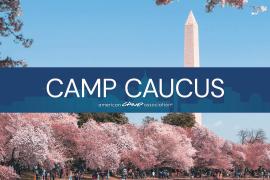What camp directors do best is being innovative when times get rough. Well, times are rough — so let the innovation begin!
Here are benefits of renting our your camp, as well as considerations for doing so — all compiled by camp professionals.
Five Reasons to Rent Out Your Camp
Jared Knight, Associate Director. Aspen Grove Family Camp
1. Provides Headcount Flexibility
Each state and county has different limits on how many people can gather. With this number, camps can set the headcount to fit these requirements. And as we have learned, these numbers may change from time to time. My camp is working with the state and the county health department to reopen in the fall. For this fall launch, we are focused on bringing in rental groups, and we will set our headcount to what it takes to open. While this is 75% less than we usually do, we have determined that we can rent to more than one group if we can provide the four factors that will keep the groups completely separated.
- Separate parking facilities
- Separate buildings for restroom facilities
- Separate buildings for housing, conference rooms, and breakout rooms
- Separate buildings for eating facilities
For my camp, that means two groups of 50 can be at the camp at the same time. We will still do screenings upon arrival, require face coverings, and book groups with two days in between the previous rental group so we can do a deep clean. Our dining hall will be used for one group and a large room in a different building will be a second dining hall. Food will be prepared and served in boxes for pick up in their personal dining room. Soda and juices in cans will be provided along with disposable utensils and paper cups. If the food is hot then foil containers and lids will be provided.
2. Focuses on Local Groups
Market to local rental groups within your county or state so that people are not traveling far. Half of our typical summer campers would be traveling from out of state or different countries. But rental groups can be local families and businesses who fall into the local government’s travel requirements.
3. Saves Money on Variable Costs
Labor cost is a variable so use a limited amount of staff to clean facilities, provide basic meals that are limited in choice, and select programming that requires less staff such as the swimming pool, archery, or checking out board games or sports equipment. We are using your full-time staff to run the programs instead of hiring part-time.Our program manager is certified to train and verify the skills of seasonal program staff. While we won’t be hiring seasonal staff, this full-time staff member can still run the ropes course, archery, and rifle shooting.Board games and sports equipment will be set out with cleaning wipes for individual use. Twice a day our staff will deep clean this equipment. We will also invite guests to bring their own equipment.
4. Reduces Overhead Costs
A well-written contract, expectations, and a guide that clearly defines what the camp will provide and what the rental group will provide is critical. Much of the oversight it takes to run a day camp and a residential camp is transferred over to the rental group. However, the written rules and requirements must be written out and enforced. We will be requiring written documentation for ACA Standards from each rental group. It will prepare the rental group to obtain a full understanding of their requirements in running programs and sessions in your camp. This is not like reserving a “campground” from the Forest Service and rental groups need to know this. So collecting health forms, providing trained first aid/CPR support, obtaining background checks, providing a nurse, overseeing medications, staffing age-group leaders, providing free time childcare supervision, or even food services can be the responsibility of the rental group.
5. Maintains the Physical Facilities
To prevent your camp from being run down because of lack of use, or being vandalized because no one is there, rental groups provide a presence and allows a purpose for the camp to remain open and a little revenue to keep the facilities looking their best.
Words of Wisdom about Rental Groups
Carrie Lawson, Camp Director, Camp Sealth
The most important piece of advice to understand about renting to outside groups or families is that it’s important to take the time to understand the needs and wants of the group and adapt their experience to meet their needs, rather than trying to make them “fit into” your existing program. Often this means re-thinking how you do things – schedule, food service, logistics, activities. You can provide excellent customer service by understanding the group culture/goals (for a retreat group) or the needs/wants of families (for family camps).
On the flip side, it’s also important to identify the boundaries of what you can/will offer to families or outside groups. You may get requests for things you’ve never done before (example: allowing groups to have alcohol on-site), and while you want to have good customer service, also make sure you are clear on the limits of what you can provide.
Don’t feel like you have to reinvent the wheel – many other camps have excellent rental group contracts, user guides, etc. and would be happy to share their resources so you don’t have to write new materials from scratch.
Maria Damos, Camp Director, Camp Ronald McDonald at Eagle Lake
When renting out your facility, establish a strong stream of communication with the rental group before they arrive on site. Define who their main point of contact is that you will report to for all needs once they have arrived on site and stick with that individual for the duration of the rental to avoid reporting to multiple people. Discuss all schedules, activities, policies, and procedures in-depth beforehand to ensure a clear understanding of expectations while utilizing your site. Every rental group is different, so embrace the alternative ways groups may use your site. Just because it is not the way you may run your program, does not mean it can’t function in that mode. For your camp facility--define what you will not budge on and where you will have some wiggle room operationally.
Maria Shupe, Executive Director, Highlands Presbyterian Camp and Retreat Center
First, it is all about relationships. Whether we are bringing in new groups, or working with returning groups, so much has changed. We must work closely to help them understand safe practices and the changes that have occurred, so that they can still have a fantastic experience, in a new way.
The second is, that many of those changes include things that have been part of our “gracious hospitality”, a key component of our mission. So we’ve been asking “How do we continue to extend gracious hospitality.” We aren’t allowed to have our beverage bar, so at the end of every meal, we offer guests a fresh beverage in a “to go” cup. We can’t have our salad bar for dinner and lunch, so we are working on a variety of salad plates that we can offer along with our hot entrée. How will we offer “gracious hospitality” in new ways?
David Garry, Camp Manager, Lions Camp at Teresita Pines
On the logistics side, it's good to have a reservation agreement and rules/regulations document signed off on, detailing your expectations of the group including payment, and how you'd like the Camp to be left, etc. Requiring groups to add your Camp temporarily to their insurance policy would be wise to cover yourself. And when it comes to the groups stay itself, to check in on occasion is nice, but to be more towards being like a hotel concierge is typically preferred from a group's perspective, I find (just being there for them when they have a need).
Kevin Nissen, Director, Friendly Pines Camp
Be honest and transparent. Let families know that this is new to you. Something you are offering in difficult times. They will sense your commitment. If you are responsive to their needs; mindfully creating/maintaining a safe environment for them; eager to hear honestly about their family's experiences, people will forgive your beginner's mistakes and be grateful that you are trying to provide them a meaningful experience and getaway in times when such things are rare.
Rick Garcia, Executive Director, Catholic Charities CYO
Gather data from your past, current, and future clients to measure their risk tolerance level. This data will help you develop your protocols and operating plan for your county health department approval. There is NO one size fits all in Covid operations and don’t assume anything.
The guidelines are vague, so its important that you work closely with your health department on all aspects of your operation. Sanitation protocols, chemicals, procedures, assumption of risk docs, all of it.
The fact that workers comp/insurance and Covid19 don’t play well together, ensure that your employee safety protocols are robust, and reviewed by your agency, insurance company, and health department. The more buy in and input that you receive, make your policy more robust. Time stamp and document all of your work from planning, brainstorms sessions, to implementation.
Partner with your potential guest groups on developing their own internal protocols to the mirror yours. Our experience in being open for day camp this summer is that you cannot assume that staff, participants, or parents will be consistent with the safety protocols. Have a system in place for real time and re-occurring training with your staff and participants to get onboard.
Photo courtesy of Don Lee Camp & Retreat Center in Arapahoe, NC
The views and opinions expressed by contributors are their own and do not necessarily reflect the views of the American Camp Association or ACA employees.



